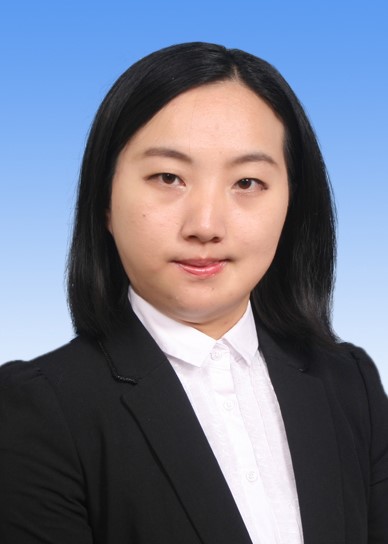
Hu Jing, Doctor of Engineering, Professor; Email: lesley123@cuit.edu.cn
Research and postgraduate enrollment direction:
1. Image Processing and Pattern Recognition
2. Strengthen learning and application
3. Smart weather
Curriculum vitae:
She has been engaged in the research of machine learning, artificial intelligence and image processing for a long time. Her current research direction is: image super-resolution reconstruction, image processing based on reinforcement learning and multi-mode meteorological data processing.
Dr. Hu Jing graduated from the control science and engineering major of Tsinghua University in January 2015 with a doctor's degree in engineering, and graduated from the School of Automation of University of Electronic Science and Technology with a bachelor's degree in engineering in July 2009. She joined Chengdu University of Information Engineering in February 2015 and engaged in the research of functional magnetic resonance analysis and processing technology in the Image Science Institute of Vanderbilt University (VUIIS) from 2016 to 2017. Now, we are cooperating with CuraCloud Corporation to study the application of algorithms for computer vision and image processing.
Dr. Hu Jing has undertaken and participated in 8 vertical projects, including the National Natural Science Foundation of China and the Science and Technology Department of Sichuan Province, with a total funding of 1.5 million yuan. Her academic achievements have been published in medical image analysis, AAAI, IJCAI, Signal Processing and other international top journals and conferences for many times, including more than 10 SCI retrieval papers and three national patent invention authorizations.
Currently undertaking scientific research projects
1. 2022/01-2026/12, a key project of the National Natural Science Foundation of China, numerical simulation of ocean sub mesoscale processes, development of parameterization schemes and research on climate effects (42130608), participated, 2.89 million yuan.
2. 2021/04-2023/03, a key research and development project of Sichuan Provincial Department of Science and Technology, research on application of free stereo video conversion and playback system (2021YFG0038), the first major research project, 1 million yuan.
3. 2017/1-2019/12, National Natural Science Foundation of China Youth Fund, Research on Super resolution Algorithm for Noisy Images (61602065), project leader, RMB 190000.
4. 2017/01-2019/12, Sichuan Provincial Science and Technology Support Plan Project, Research on Super Resolution Reconstruction of Single Image Based on Self learning (2017RZ0013), project leader, 100000 yuan.
Current teaching:
"Software Engineering Theory and Application", postgraduate
"Advanced Engineering Mathematics" Postgraduate
"Discrete Mathematics", undergraduate
"Data Statistics and Application", undergraduate
Papers published in recent 5 years (* is the corresponding author):
Journal Papers
1. Jing Hu, Chuan Tian, Buhong Ge, Xiaomeng Huang*, Xi Wu*. A climate downscaling method based on deep back-projection neural network[J]. CLIVAR Exchanges, 81:24-26.
2. Jing Hu, Ziwei Luo, Xin Wang*, Shanhui Sun, Youbing Yin, Kunlin Cao, Qi Song, Siwei Lyu, Xi Wu*. End-to-end multimodal image registration via reinforcement learning. Medical Image Analysis 2020, (SCI Zone I, IF: 11.148)
3. Jing Hu*,Xinyan Li,Xiaolong Wang, Yan Li,Xi Wu. Noise-robust mri upsampling using adaptive local steering kernel. IEEE Access, 2020 (8): 158538 – 158548 (SCI Zone II, IF: 3.745)
4. 姚明青,胡靖*. 基于深度强化学习的多模态医学图像配准. 计算机辅助设计与图形学学报. 2020,32(8):1237-1247. (CCF A类中文期刊)
5. Ziwei Luo, Xin Wang,Xi Wu,Youbing Yin,Kunlin Cao,Qi Song,Jing Hu*. A Spatiotemporal Agent for Robust Multimodal Registration. IEEE Access, 2020 (8): 75347 – 75358. (SCI Zone II, IF: 3.745)
6. 萧澍,胡靖*,王彦芳. 椭圆窗口和参数自适应的非局部均值算法。计算机辅助设计与图形学学报。2020, 32(1):1-11. (CCF A类中文期刊)
7. Jing Hu, Jiliu Zhou, Xi Wu*. Noise robust single image super-resolution using a multiscale image pyramid. Signal Processing. 2018, 148: 157-171. (SCI Zone II, IF 3.110, CCF Class C)
8. Jing Hu, Xi Wu*, Jiliu Zhou. Second-order regression-based MR image upsampling. Computational and Mathematical Methods in Medicine, 2017, Article ID 6462832. (SCI Zone IV, IF: 0.887)
9. Yanfang Wang*,Qian Huang,Jing Hu. Adaptive enhancement for non-uniform illumination images via nonlinear mapping. Journal of Electronic Imaging, 26(5), 053012 (2017). (SCI Zone IV, IF: 0.754)
Conference Papers
1. Ziwei Luo1, Jing Hu1, Xin Wang*, Shu Hu, Bin Kong, Youbing Yin, Qi Song, Xi Wu* , Siwei Lyu. Stochastic Planner-Actor-Critic for Unsupervised Deformable Image Registration. AAAI 2022 (CCF Class A meeting)
2. Ziwei Luo1, Jing Hu1, Xin Wang*, Siwei Lyu, Bin Kong, Youbing Yin, Qi Song, Xi Wu*. Stochastic actor-executor-critic for image-to-image translation. IJCAI 21 (CCF Class A meeting)
3. Sun SH#, Hu J#, Yao MQ, et al. Robust multimodal image registration using deep recurrent reinforcement learning. ACCV 2018, Perth. (CCF Class C)
4. Jing Hu*, Jiaxin Li, Wu X, Zhou JL. Noise robust single image super-resolution using a multiscale image pyramid. ICIP, 2018, Athens (CCF Class C)
5. Shu Xiao, Jing Hu*, Yanfang Wang. Non-local means with steer search window and adaptive parameter. IEEE International Conference on Signal and Image Processing, 2018, Shenzhen.
6. Jiaxin Li, Jing Hu, Min Wei, Bin Zhang, Yanfang Wang. Non-uniform noise image denoising based on non-local means. 2018, IIP.
7. Jing Hu, Adaptive-Order Regression-Based MRI Image Super-Resolution. The Proceedings of the International Conference on Sensing and Imaging, Lecture Notes in Electrical Engineering 506, 2018.
8. Jing Hu , Rogers B, Wu X, Landman B, Anderson A.W., Abou-Khalil B, Morgan V.L., and Ding ZH*. Characterization of structural and functional connectivity in epilepsy by integrating diffusion and functional tensor imaging. ISMRM 2017, Hawaii.
9. Jing Hu, Rogers B, Wu X, Landman B, Anderson A.W., Abou-Khalil B, Morgan V.L., and Ding ZH*. Structural and functional connectivity in white matter: combined diffusion and functional tensor imaging of epilepsy. ISMRM workshop on Quantitative MRI in White Matter Disorders: Useful, Usable, Used? (accepted). 2017, Vancouver.